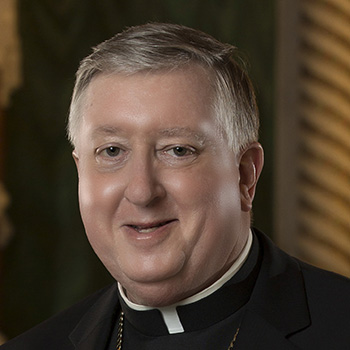SERVE THE LORD WITH GLADNESS | God’s holiness is the standard for our action
However, God doesn’t wait until we are holy to love us; He loves us so we may become holy

Dear brothers and sisters in Christ,
The readings for the first full week of Lent are organized around themes that are helpful for the Lenten journey.
One of the most important of those themes is indicated by the fact that the opening and closing lines for the week converge on the same point. In the opening line, from Leviticus 19:2, God tells the Israelites: “Be holy, for I, the Lord, your God, am holy.” It’s a powerful charge: God’s holiness is to be the standard for Israel’s holiness! In the closing line, from Matthew 5:48, Jesus says: “So be perfect, just as your heavenly Father is perfect.” Jesus picks up and reinforces the point: God’s holiness is the standard for our action.
The theme of perfection and holiness, however, is sometimes emphasized in the wrong way, as though God won’t love us until we’re perfectly holy. Thankfully, the rest of the readings this week give us a different understanding of how we should understand the call to holiness.
The prophet Ezekiel helps to make the point clear. On the one hand, he says: “If the wicked man turns away from all the sins he committed … None of the crimes he committed shall be remembered against him.” On the other hand, he says: “And if the virtuous man turns from the path of virtue to do evil … None of his virtuous deeds shall be remembered.”
People in ancient Israel had started to consider their relationship with God as a kind of ledger: God would pay out a reward for every good deed and exact a payment for every bad deed. Ezekiel was telling the people: Our relationship with God is not a ledger. It’s about the heart. And the turning of the heart is the main thing that captures God’s attention.
The repentance of Nineveh, which we hear about this week, is a perfect example. The people of Nineveh had plenty of bad deeds on the debit side of the ledger, and Jonah announced that payment was coming due. But then the whole city repented. God saw the turning of their hearts and forgave the debt.
This theme is taken up and perfected in the life of Jesus, who didn’t hesitate to reach out to sinners. In fact, the whole Incarnation was a reaching out to sinners! Likewise, in His ministry, Jesus didn’t wait until people were perfect to love them. He loved them first. And because He loved them, He reached out to them with the hope of turning their hearts. His reaching out was both an invitation and a promise: If you turn from sin, if you turn toward me, then you and I will walk the long road to perfection together, and my love will make it possible for you to get there.
There’s no compromising this Scriptural truth: God’s goal for us is perfection. But that has to be coupled with another Scriptural truth: God doesn’t withhold His love until we’re perfect. No, He grants His love so that we might become perfect.
Can we learn to hold both those truths together – both in our own hearts, and in how we share the Good News with others? If we can, we ourselves can have a Lent that is at once joyful and challenging, and our sharing of the Good News with others will be a powerful and intriguing invitation.



